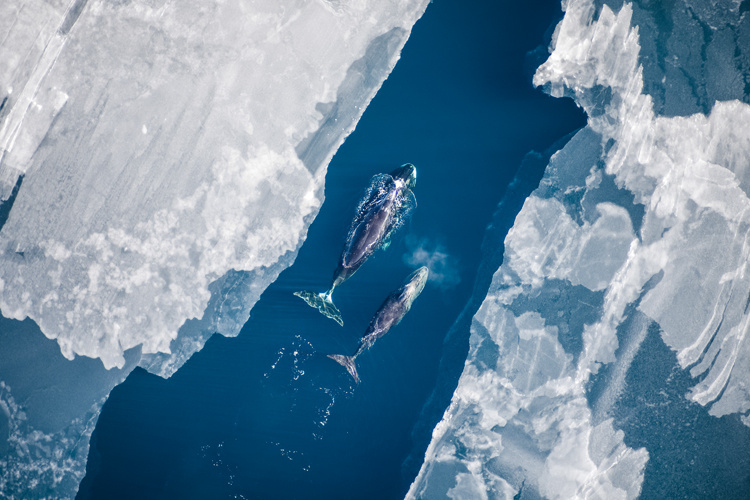
Credit: Amelia Brower/NOAA Fisheries/AFSC/MML & North Slope Borough. NMFS Permit No. 14245AFSC.
An NCCOS-funded study, published in Nature, shows that rising levels of algal toxins in bowhead whales are linked to ocean warming, threatening food security for Alaska Native communities reliant on the whales for subsistence.
Between 2004 and 2022, a multi-institutional group of researchers led by NOAA’s Northwest Fisheries Science Center regularly tested bowhead whales harvested from the Beaufort Sea by Alaska Natives during annual subsistence hunts. Since the whales filter seawater for their food, the team realized that fecal samples from the whales could reveal toxins in the whales’ environment.
The scientists found that the prevalence and concentrations of domoic acid and saxitoxin in the feces — potent neurotoxins that can cause serious illness, even death, in people and animals — increased significantly during the study period. Further analysis showed a clear relationship between the higher levels of these algal toxins and warmer water moving into the Beaufort Sea, reduced sea ice in the region, and specific wind patterns and atmospheric pressure changes.
Marine resources have long been essential for the nutritional, cultural, and economic well-being of Alaska’s coastal communities. The study’s findings demonstrate that warming Arctic waters are exacerbating harmful algal blooms and increasing the potential for exposure to their toxins, underscoring the need for ongoing and enhanced monitoring to protect marine resources and public health.
The project was supported by the NCCOS Ecology and Oceanography of Harmful Algal Blooms (ECOHAB) Program, which funds research to advance understanding of the causes and impacts of harmful algal blooms. ECOHAB research informs management of coastal resources to reduce the impacts and future threats from these events.
The study was authorized by the Harmful Algal Bloom and Hypoxia Research and Control Act (33 U.S.C. §§ 4001 et seq.) and the NOAA Authorization Act of 1992, Pub. L. 102-567 (Oct. 29, 1992); sec. 201(c), which directs appropriation for NCCOS to augment and integrate existing NOAA programs to improve predictions of coastal hazards and protect human life and property.
Related news:
- NOAA Fisheries: Samples from Bowhead Whales Link Ocean Warming to Rising Algal Toxins in Arctic Waters
- WHOI: Fecal samples from bowhead whales link ocean warming to rising algal toxins in Arctic waters
- University of Alaska Fairbanks: Whale poop links toxic algal blooms to ocean warming
- Nature podcast: Using whale poo to study toxic algae in the Arctic
- Oceanographic: Higher toxins in bowhead whale poo sign of warming Arctic ocean
